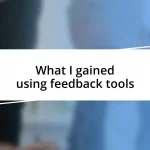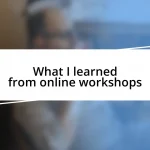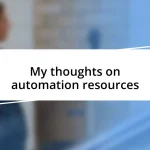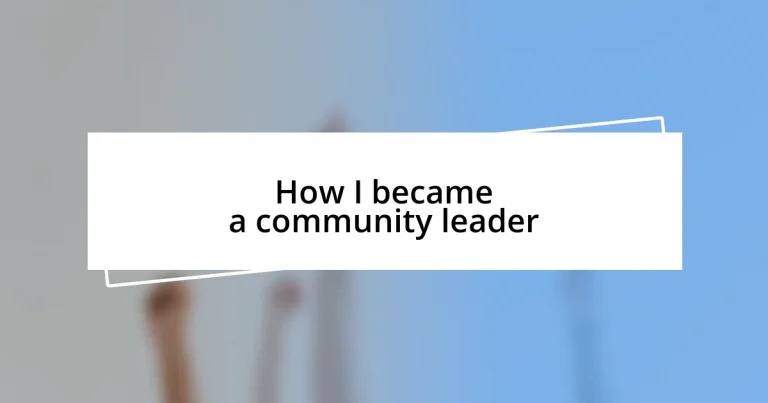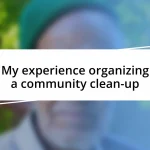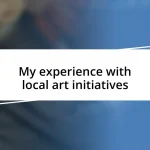Key takeaways:
- Recognizing the power of community collaboration was pivotal in sparking the author’s leadership journey, emphasizing effective leadership as a collective effort.
- Active listening and understanding community needs, illustrated through surveys and engagement, are crucial for successful initiatives and fostering trust.
- Continuous evaluation of the impact of initiatives and transparent communication significantly strengthens community relationships and informs future actions.
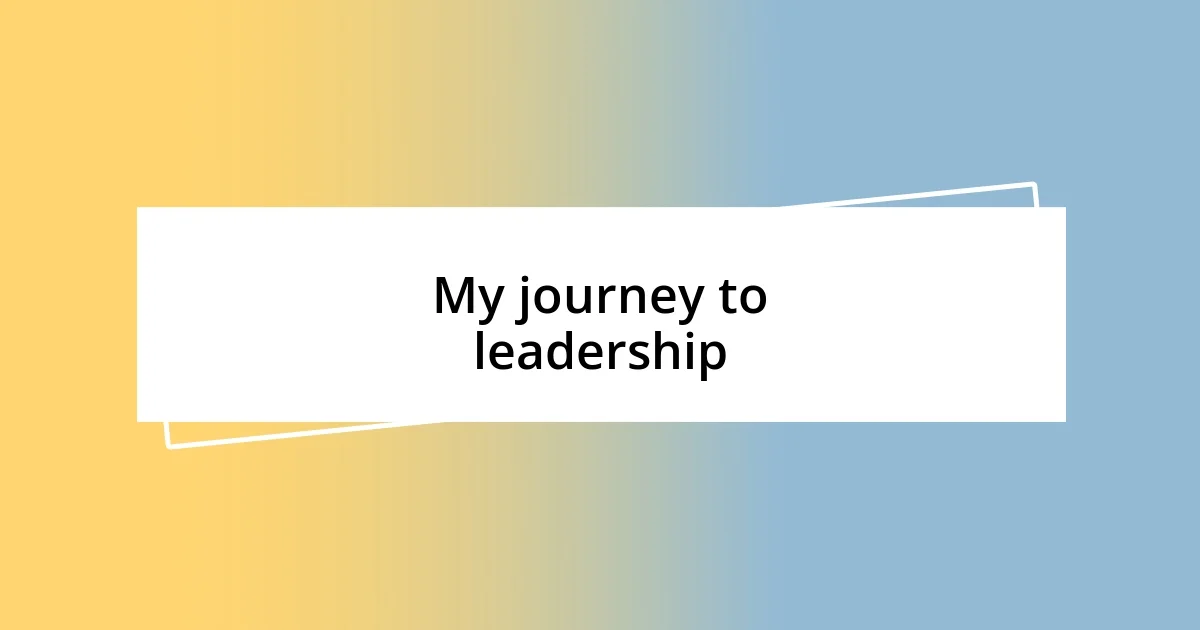
My journey to leadership
My journey to leadership wasn’t always clear. I remember the moment I stepped up to organize a local clean-up event after seeing my neighborhood’s littered parks. I was nervous, but that initial action sparked something within me—a realization that I could influence change directly.
As I began to connect with others in the community, I discovered I wasn’t alone in my desire to make a difference. I still recall the conversations with my neighbors, full of ideas and laughter as we brainstormed ways to improve our environment. How often do we overlook the power of community when striving for leadership? Those shared moments taught me that effective leadership is built on collaboration and trust.
Gradually, I found myself taking on more responsibilities, whether it was leading meetings or coordinating with local organizations. I still feel that rush of excitement when I see people rallying around a cause. It’s a reminder that leadership isn’t just about making decisions; it’s about inspiring others to join the journey, igniting passion, and creating a sense of belonging.
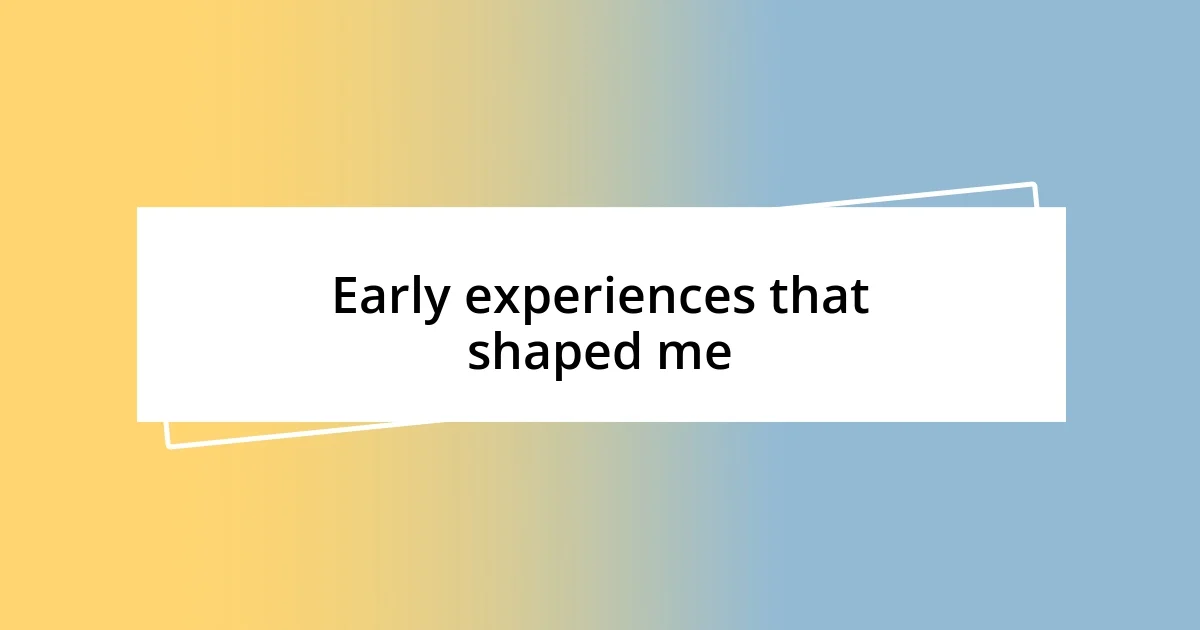
Early experiences that shaped me
Early experiences can truly shape who we become as leaders. I recall my first foray into community involvement at a young age, when I volunteered at a local food bank. Standing alongside others, sorting food packages, I felt a sense of belonging and purpose that was new to me. It was here that I learned the importance of teamwork and the impact we could have when we came together for a common goal.
- Volunteering at the food bank instilled a sense of empathy.
- Witnessing the gratitude of those we helped motivated me to continue serving my community.
- Participating in school-led initiatives taught me to appreciate diverse perspectives and ideas.
Looking back, these formative moments not only nurtured my compassion but also ignited the spark of leadership. They propelled me into roles of greater responsibility as I learned to listen and act on the needs around me. This early commitment laid the groundwork for everything that would follow in my journey.
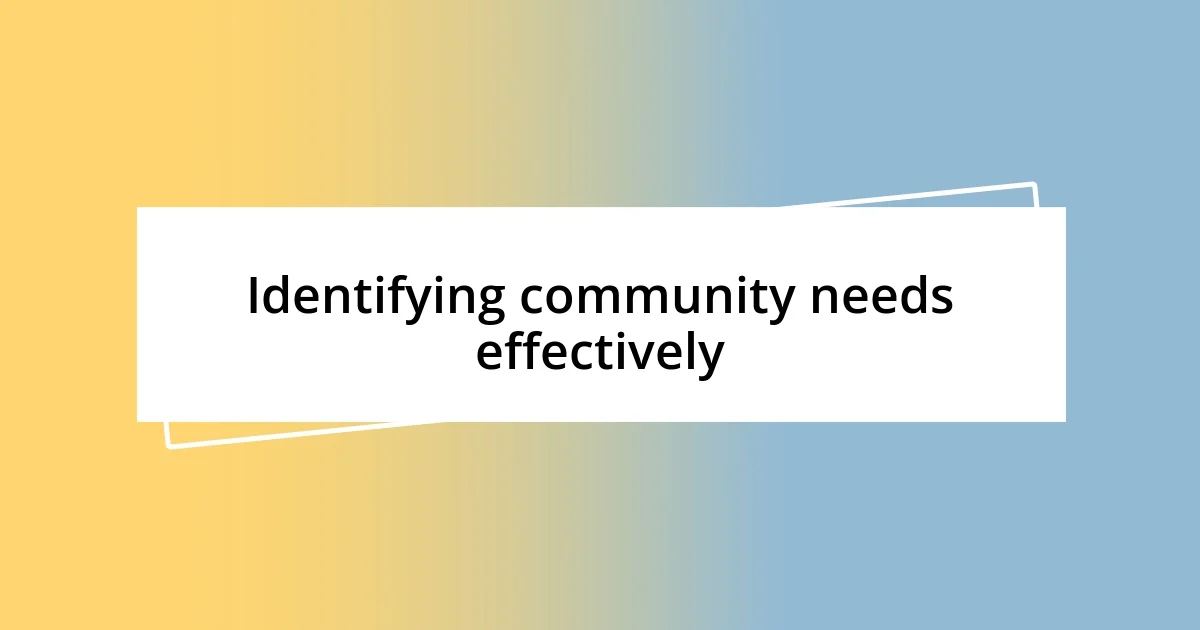
Identifying community needs effectively
Identifying community needs effectively requires listening more than speaking. I remember attending a town hall meeting that felt more like a shouting match than a constructive dialogue. Amid the noise, I learned the importance of facilitating discussions where everyone felt heard. It was eye-opening to see how people became more engaged when they realized their voices mattered. We can’t underestimate the power of active listening; it not only reveals needs and issues but also fosters trust within the community.
Another pivotal moment came when I initiated a survey in my neighborhood. To my surprise, residents were eager to share their thoughts and concerns. We discovered that many were struggling with food security, something I hadn’t been aware of before. Gathering this information helped me and others prioritize our actions. It’s a reminder that effective need identification often relies on delving deeper, asking questions, and genuinely caring about the response. I believe this process is essential, as it sets the foundation for any community project.
Lastly, collaboration with local organizations can significantly enhance our understanding of community needs. I’ve teamed up with nonprofits that specialize in social issues, and I’ve typically found them invaluable. They possess insights and data that can paint a broader picture of what the community truly requires. Engaging with them has taught me that we’re stronger together; each voice adds to a richer understanding of challenges and opportunities. Isn’t it fascinating how the collective wisdom of various stakeholders can spark innovative solutions?
| Method | Benefits |
|---|---|
| Active Listening | Builds trust; encourages community engagement. |
| Surveys | Uncovers specific concerns; sets priorities for action. |
| Partnerships with Organizations | Provide insight; enhance resource allocation. |
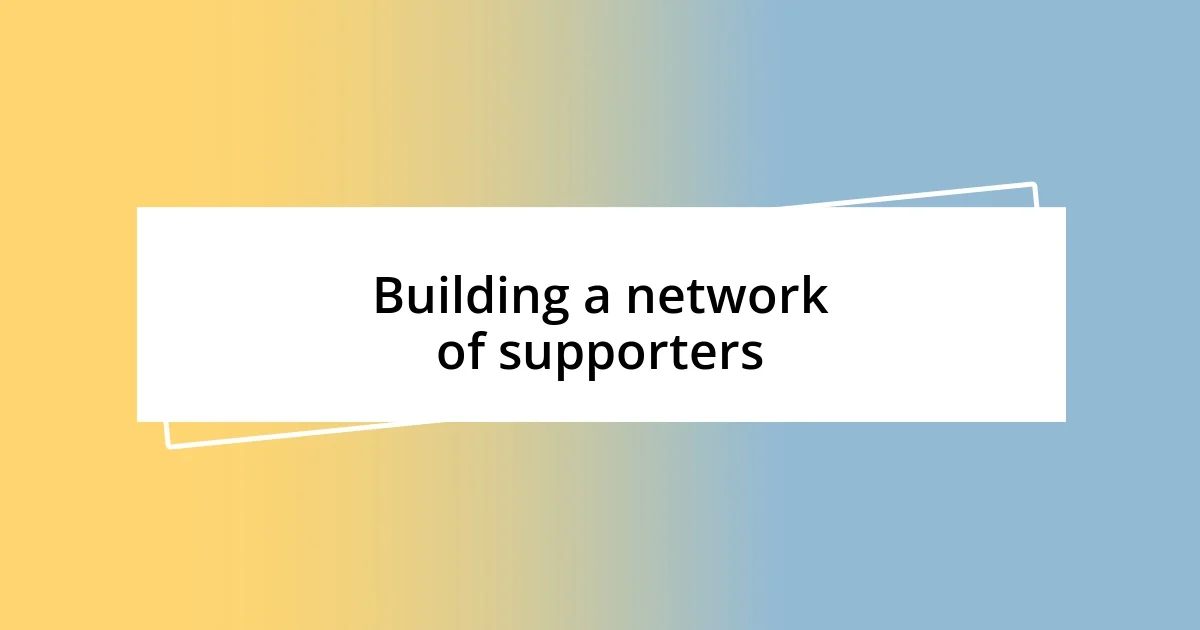
Building a network of supporters
I’ve always believed that building a network of supporters is like cultivating a garden. For me, it began with reaching out to friends and acquaintances who shared a passion for community involvement. I remember organizing a small gathering where we could brainstorm ideas and share our experiences. To my surprise, everyone left inspired and connected, eager to contribute. This sense of camaraderie was invigorating; it taught me that when people come together, their collective energy can fuel impactful change.
As I ventured further into my role, I made a conscious effort to connect with local leaders and activists. One memorable coffee chat was with a seasoned community organizer who shared invaluable insights about advocacy. Listening to their journey made me realize that every connection holds the potential for mentorship and guidance. Have you ever experienced a moment where a chance meeting transformed your perspective? I certainly have, and it reinforced my belief that I should actively nurture these relationships.
Over time, I’ve learned that showing genuine appreciation for my supporters cultivates loyalty and motivation. I once hosted a small appreciation event for volunteers, just to celebrate our shared efforts. The room buzzed with laughter, stories, and a sense of accomplishment. It was here that I realized my role was to acknowledge their contributions and harness that energy to propel our initiatives forward. Building this network isn’t just about numbers; it’s about fostering a community spirit that inspires and empowers, don’t you think?
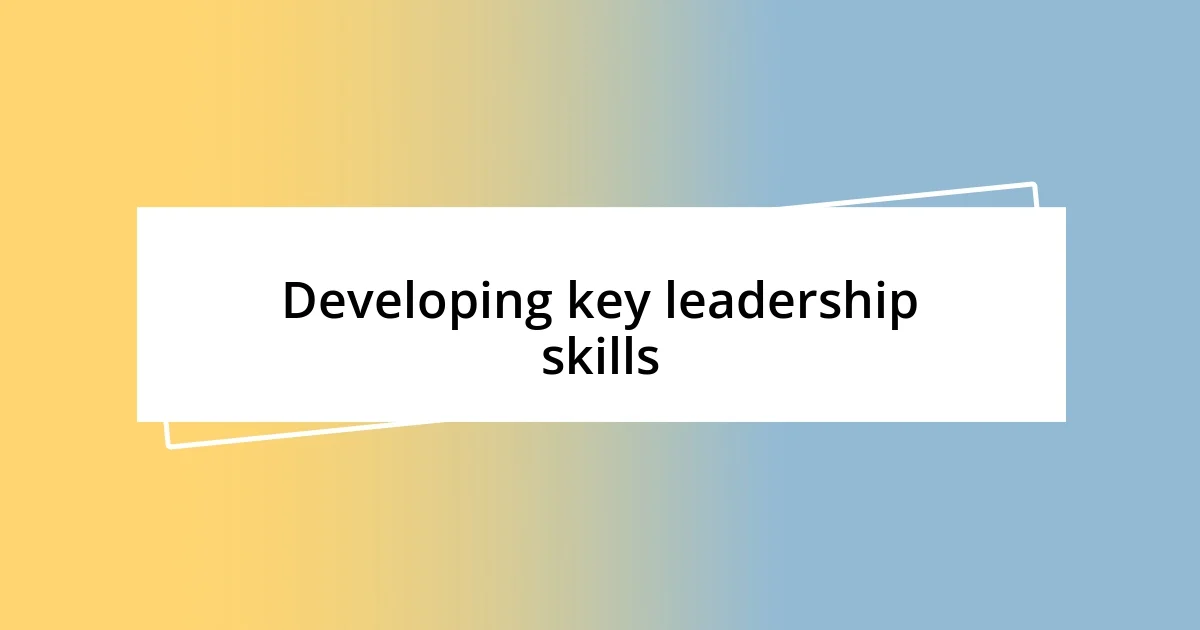
Developing key leadership skills
Developing key leadership skills is something I’ve found to be a continuous journey filled with learning and self-awareness. When I first stepped into community leadership roles, I often struggled with decision-making. I vividly remember a project meeting, where I hesitated to voice my opinion. It was only when I saw the impact of my ideas being sidelined that I realized decisiveness is crucial. Have you ever felt the weight of uncertainty in a leadership role? Believe me, taking that first step to assert my ideas was liberating and helped me grow.
Along the way, I discovered the importance of adaptability. At one point, I was working on a community event that initially had low participation expectations. Then, I decided to pivot and include interactive elements like workshops and live performances. The result? An unexpected turnout and enthusiastic feedback! It was a profound experience, highlighting how flexibility in planning can lead to greater community engagement. How often have you had to adjust your approach on the fly? Embracing change not only fosters resilience but also allows leaders to connect with their community in meaningful ways.
Communication emerged as another critical skill. I distinctly recall an incident where a miscommunication led to confusion among volunteers. We struggled to coordinate tasks effectively. From that moment, I made it a point to emphasize clarity in all interactions. I began using visual aids and sending regular updates, and it transformed our group’s efficiency. Have you ever faced the consequences of ambiguous communication? It reinforced my belief that the right words can bridge gaps and elevate collaboration, making a world of difference in achieving common goals.
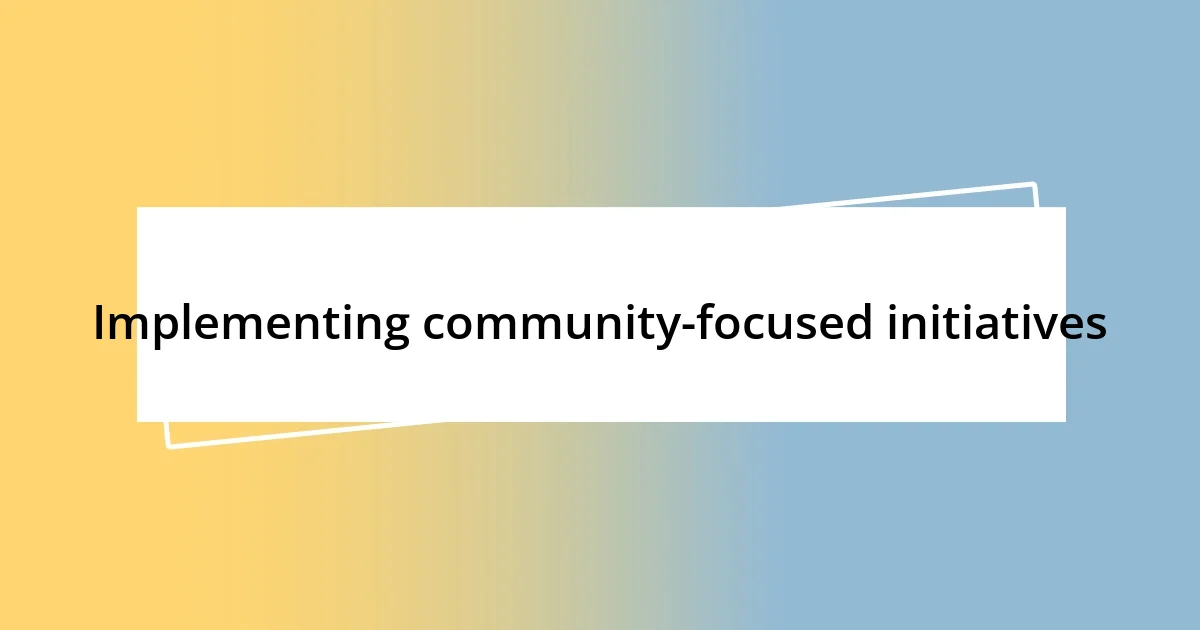
Implementing community-focused initiatives
Implementing community-focused initiatives has been one of the most rewarding aspects of my journey. I recall initiating a community clean-up day that brought together people from different backgrounds. It started with a simple idea, but seeing families, friends, and even strangers unite for a common purpose was a heartwarming experience. Have you ever felt that electric energy when a group shares a vision? It’s something special that can turn a small idea into a significant movement.
I also discovered that understanding community needs is vital when planning initiatives. During a neighborhood meeting, a resident shared her concerns about a lack of safe play areas for children. That moment struck a chord with me. It inspired me to spearhead a project to transform a neglected park, adding playground equipment and picnic areas. The joy on the kids’ faces when the park opened was priceless. It was a reminder that when we listen actively, we can create spaces that truly serve our community.
Moreover, I’ve learned to measure success not just by the output but by the lasting relationships fostered through these initiatives. For instance, after launching a series of workshops aimed at teaching adults essential skills, I noticed friendships blossoming among attendees. It wasn’t just about the knowledge they gained; it was about forging connections that enriched their lives. Isn’t it fascinating how initiatives can evolve into support networks? Each time I witness this growth, I’m reminded of the profound impact we can have when we focus our efforts on shared purpose.
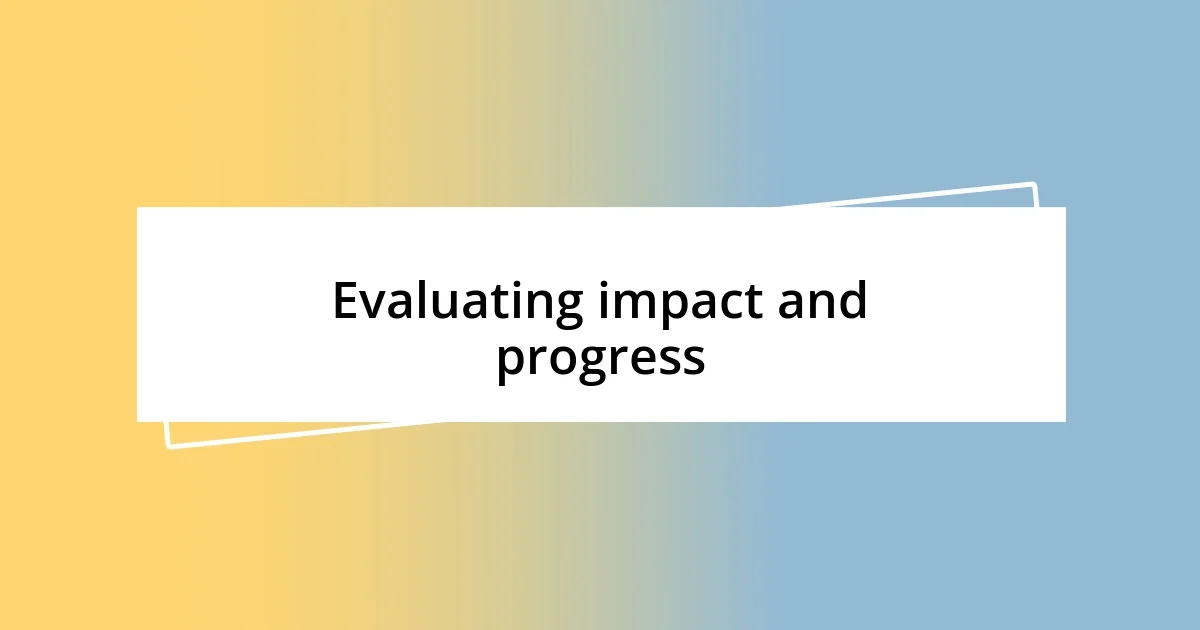
Evaluating impact and progress
Evaluating the impact of my initiatives has always been a vital aspect of my leadership. I remember conducting a simple survey after our community garden project concluded. The results were overwhelmingly positive; not only did participants express their joy in cultivating their own fruits and vegetables, but they also noted an increase in neighborly interactions. Have you ever gauged the success of a project through the joy it brings to your community? It was a powerful reminder that our efforts resonate far beyond the tangible outcomes.
Tracking progress can also feel daunting, but I’ve found it immensely rewarding. After hosting a series of workshops aimed at enhancing digital literacy in our community, I created a follow-up program to assess participants’ growth. I was thrilled to observe that many went on to secure jobs that required those very skills! How often do we celebrate those personal victories? It’s a testament to how fulfilling it can be to see individuals thrive as a direct result of our work, reinforcing the importance of ongoing evaluation.
Finally, transparent communication about our goals and successes cultivates trust within the community. I initiated monthly feedback sessions where community members could voice their thoughts on the initiatives. Some sessions were emotional, with stories shared about how our programs changed lives. Have you ever experienced that raw honesty? It brought a profound sense of purpose to our work, showing me that involvement and open dialogue are essential for measuring true impact. Without this ongoing conversation, it becomes all too easy to lose sight of our mission and the people we’re truly serving.



